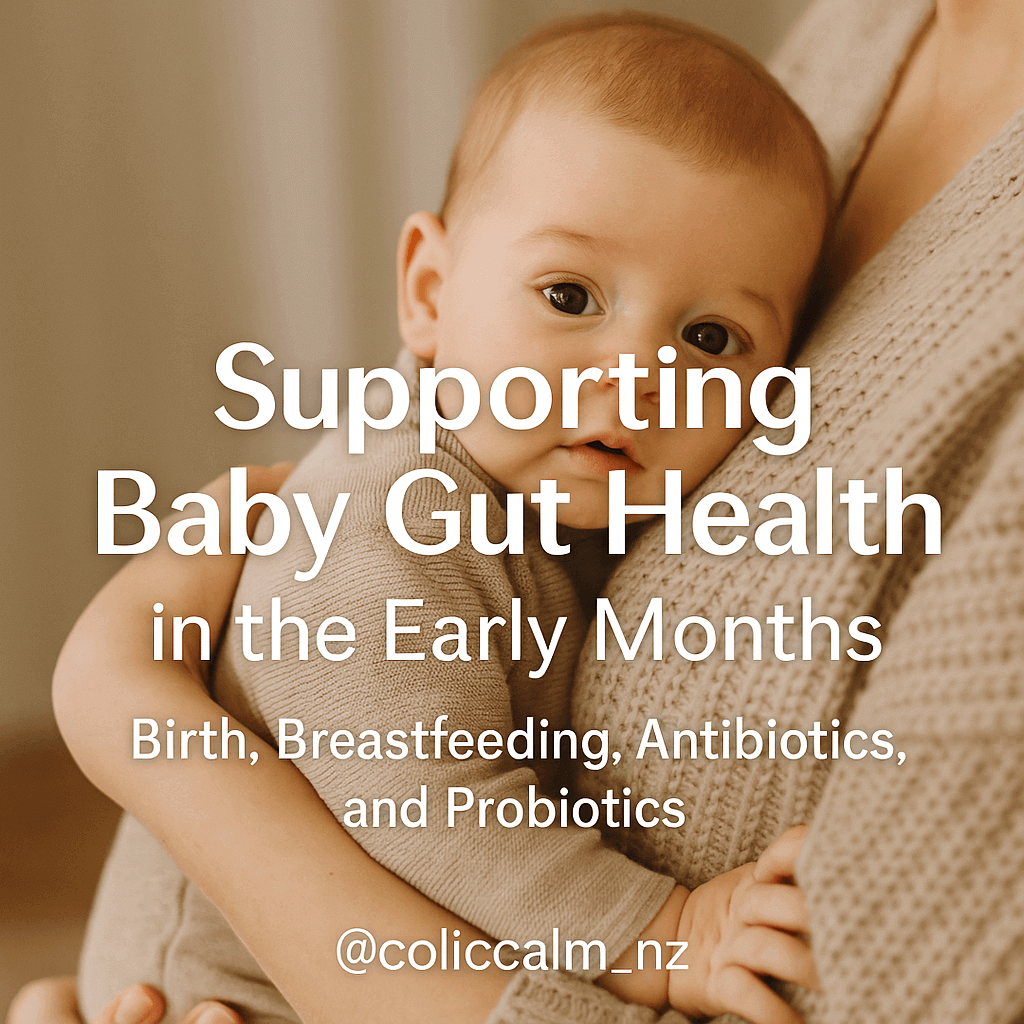Click to Learn More

Supporting Baby Gut Health in the Early Months
Introduction
In the first few months of life, a baby’s digestive system is maturing rapidly. Every feed, every bacteria, every gentle touch counts. When we talk about gut health in babies, we mean how well their tummy ecosystem — known as the microbiome — works to aid digestion, support natural immune development, and maintain balance.
This article explores how birth type, breastfeeding, antibiotic exposure, and probiotics can influence gut health — and how parents in Aotearoa can use gentle, informed approaches (including CalmCo Probiotic + D3 drops) as part of their baby’s daily routine.
What Is Gut Health (for Babies)?
“Gut health” refers to the balance of beneficial microorganisms in the intestines. In babies, a healthy gut supports:
-
Smooth digestion and absorption of milk nutrients
-
A strong gut barrier
-
The normal development of the immune system
Scientists call this bacterial community the microbiome. It begins forming at birth and continues to evolve throughout infancy and early childhood. A balanced early microbiome supports digestive comfort and normal immune function.
Birth Mode: Vaginal vs C-Section
How a baby is born can influence their first exposure to bacteria:
-
Vaginal birth: The baby is exposed to the mother’s natural bacteria during birth, helping seed early gut microbes.
-
Caesarean birth (C-section): Babies born by C-section have a different early bacterial profile — often fewer Bacteroides species.
These differences usually even out over time, especially with breastfeeding and gentle feeding practices. “Vaginal seeding” (swabbing the baby with the mother’s fluids) is not recommended in New Zealand, due to limited evidence and infection risk.
Breastfeeding and Early Nutrition
Breast milk is a natural builder of baby gut health. It contains:
-
Human Milk Oligosaccharides (HMOs), which act as food for beneficial bacteria
-
Immune cells and antibodies that support the gut barrier
-
Prebiotics and enzymes that help develop healthy digestion
Formula-fed babies also thrive, and many formulas now include nutrients designed to support digestive comfort. Regardless of feeding method, babies’ microbiomes become more complex as they begin solids around 4–6 months.
Antibiotics and Gut Balance
Antibiotics can sometimes disrupt gut bacteria, reducing both good and bad microbes. Most babies’ microbiomes recover naturally, though the process can take time. Parents can support this by:
-
Feeding calmly and regularly
-
Avoiding unnecessary antibiotic use
-
Considering probiotics (under healthcare guidance) if antibiotics were recently used
Probiotics, Vitamin D, and CalmCo Probiotic + D3 Drops
Probiotics are live microorganisms that can support microbial balance when consumed in appropriate amounts. In babies, strains such as Bifidobacterium and Lactobacillus are often used.
Vitamin D is essential for normal immune system function and overall health. In New Zealand, many infants are recommended Vitamin D supplementation, particularly those who are breastfed or have limited sun exposure.
CalmCo Probiotic + D3 drops combine selected probiotic strains with Vitamin D3 to support the maintenance of digestive balance and normal immune system health. As with any supplement, always use it as directed and consult your healthcare professional if you are unsure.
Everyday Ways to Support Gut Health
Here are simple, non-product ways to nurture your baby’s tummy:
-
Feed in a calm, unhurried setting.
-
Burp regularly after feeds.
-
Allow tummy time and gentle movement.
-
Practice skin-to-skin contact and bonding.
-
Use antibiotics only when medically necessary.
-
Introduce solids gradually, choosing fibre-rich, minimally processed foods.
When to Seek Advice
Contact a healthcare professional if your baby:
-
Refuses feeds or vomits frequently
-
Shows poor weight gain
-
Has ongoing discomfort, bloating, or unusual crying
-
Displays concerning symptoms such as fever or blood in stool
It is always best to check with your GP, midwife, or Plunket nurse if you have any concerns.
Conclusion
Gut health develops from birth and is shaped by many factors — including birth mode, feeding, and environment. While differences exist, a baby’s digestive system is wonderfully adaptable. Through breastfeeding, balanced nutrition, probiotics, and daily nurturing, parents can help support digestive comfort and normal immune system function in the early months.
For more information and resources, visit Colic Calm NZ.
Disclaimer
Always read the label and use as directed. Dietary supplements are not a replacement for a balanced diet. This information is not medical advice. If symptoms persist, see your healthcare professional. Colic Calm NZ, Wellington.
🔗 References
-
Frontiers in Microbiology – Impact of delivery mode on infant gut microbiome development.
-
MDPI – Breast milk and the infant gut microbiome.
-
Nature – Gut microbiota development differs between breastfed and formula-fed infants.
-
Frontiers in Cellular and Infection Microbiology – Antibiotic use and microbiome recovery in infants.
-
PMC – Infant gut microbiome and long-term health outcomes.
-
Nutricia Professional NZ – Prebiotics, probiotics, and synbiotics in infant nutrition.
